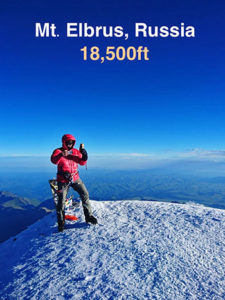 There are mountain climbers, pilots and skydivers that will immediately answer this question: If you had a choice of any water in the World, what would you choose for your extreme-condition survival? Individuals with military special ops. training who are seeking to break performance records without experiencing either fatigue or hypoxia, are packing bottles of Watt-Ahh to drink during and after their arduous workout. The most recent testimonial is from a mountain climber who is a retired Lieutenant of the Italian Mountain Troops (see below). He reports drinking Watt-Ahh allowed him and his guide to complete the 2,000 ft. summit ascent and decent on a mountain in Russia in record time.
There are mountain climbers, pilots and skydivers that will immediately answer this question: If you had a choice of any water in the World, what would you choose for your extreme-condition survival? Individuals with military special ops. training who are seeking to break performance records without experiencing either fatigue or hypoxia, are packing bottles of Watt-Ahh to drink during and after their arduous workout. The most recent testimonial is from a mountain climber who is a retired Lieutenant of the Italian Mountain Troops (see below). He reports drinking Watt-Ahh allowed him and his guide to complete the 2,000 ft. summit ascent and decent on a mountain in Russia in record time.
Inventor Rob Gourley is not surprised by their preferred choice in the structured water. He explains … “The plasma water gas, that we call DiTetra Gas, is infused into the water. It provides oxygen delivery to the blood stream that supports pulmonary function under extreme conditions thereby minimizing ARDS (acute respiratory distress syndrome) and the effects of high-altitude sickness.” Gourley who is CEO of both AquaNew and WIT International of Sarasota, FL. continues … “We receive reports from both pilots and extreme athletes that they monitor their blood oxygen levels and will drink Watt-Ahh to raise the oxygen back to a more normal level without using cumbersome supplemental oxygen tanks. We call it ‘Hydration Respiration‘.”
Some doctors describe the ARDS associated with COVID-19-related inflammation similar to that of high-altitude sickness. The lung tissue becomes dehydrated with blood vessel breakage oozing protein exude that block gas exchange critical for life. Breathable DiTetra Gas allows the lungs to keep working under normal pressures creating an active rehydration of the lung passageways needed to discharge accumulated matter. Once inflammation and exude are reduced and gas exchange is restored to the lung tissue, the patient can recover.
Gourley, who is a mechanical engineer, told us that ventilators are antiquated mechanical devices that will not allow in many cases for lungs to recover and recommence working on their own. Oxygen under pressure can cause permanent damage to lung tissue. Gourley is willing to work on redesigning a total makeover of the old ventilator systems that will produce instead DiTetra Gas.
In the interim and for this current pandemic, Gourley recommends drinking the DiTetra Gas-enriched water that is a good way to boost the immune defenses of your lungs against viruses. “Pandemics will occur again … it is part of the human condition on Earth. Human invention that harnesses the energy of water needs to be part of our arsenal against the viral-ravages of our lungs.”
New Testimonial from an Alpine Mountain Climber
“I am an alpine mountain climber and climb tall mountains from 14,000ft  to 20,000ft (for now).
to 20,000ft (for now).
A couple of years ago I climbed Mt. Rainier in Washington state (14,410ft) and it was a very difficult climb because of short acclimatization period.
In my next climb adventure (Cotopaxi) 19,347ft in Ecuador I did not encounter any problems, but it took me one week to acclimatize before successfully reaching the top.
My recent climb of Mt. Elbrus (18,481ft) in southern Russia was a different story. I prepared myself drinking plenty of Watt-Ahh a couple of weeks before the climb and a couple of bottles before the final push to the summit (I could only bring a few bottles to Russia).
When I reached the base camp of Mt. Elbrus, my guide told me that it should take at least 10 hours to reach the summit from that point because we did not acclimatize enough… I mentioned to him that I was ready to climb and come down in approx. 6 hours. This meant to go up for approx. 2,000ft and come back to base camp descending 2,000ft of steep snow fields. We did the task in 6 hours and 1 minute. I could not believe what I have accomplished: I started with a steady pace going up (usually I slow down because of lack of oxygen at higher elevation) and no symptoms of hypoxia or fatigue. On the way down I started to run … I really had to slow myself down.
I believe that drinking Watt-Ahh really helped me to do this climb in an exceptional physical shape and without major difficulties.
I have other climbs planned and will definitely consider using this water again… who knows what next.
Thanks.” Williams (Retired Lieut., Italian Mountain Troops)
